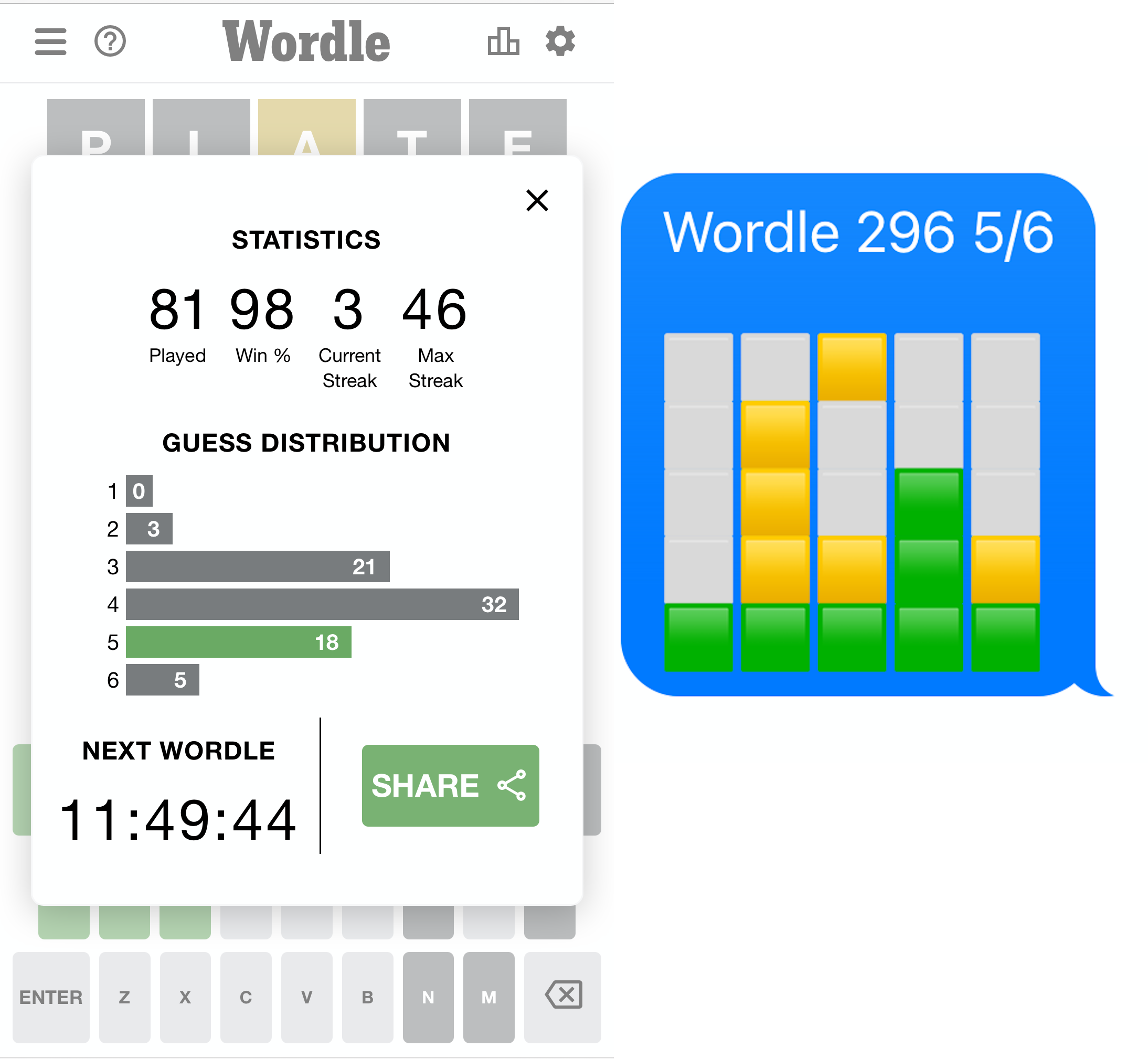April 12, 2022
Three Ways Wordle is Like Writing
By Maggie Smith
 Have you caught the Wordle bug yet? Each morning The New York Times posts a new Wordle puzzle on the internet and you have one day to solve it. The answer is a five-letter word and you get six tries. Each guess must be a valid five-letter word. After you type in your guess and hit the enter button, the color of the tiles changes to reflect how close your guess came. Wrong guesses get blacked out on the keyboard. If a letter in your word is correct but not in the correct position, it will show as yellow; if it’s correct AND in the right position, it will show as green. If you haven’t played it yet, give it a try. It’s amazingly addictive and besides, everyone is doing it! You want to hang out with the cool crowd, don’t you?
Have you caught the Wordle bug yet? Each morning The New York Times posts a new Wordle puzzle on the internet and you have one day to solve it. The answer is a five-letter word and you get six tries. Each guess must be a valid five-letter word. After you type in your guess and hit the enter button, the color of the tiles changes to reflect how close your guess came. Wrong guesses get blacked out on the keyboard. If a letter in your word is correct but not in the correct position, it will show as yellow; if it’s correct AND in the right position, it will show as green. If you haven’t played it yet, give it a try. It’s amazingly addictive and besides, everyone is doing it! You want to hang out with the cool crowd, don’t you?
But these last few weeks, as I’ve settled in with my first cup of coffee and played, I’ve realized how this simple little word game has a lot in common with writing (the activity I’m supposed to be doing when I drink my SECOND cup of coffee). To wit:
There are lots of different ways to get there.
Wordle accommodates all types of personalities. Maybe you like to play it safe. You pick the same first word every time. You pick first words with lots of vowels (adieu seems to be a favorite.) You don’t guess until you’re pretty sure you’re right. In other words, you take the analytical approach. Or conversely, you throw stuff against the wall. You change up your first guess every time (my approach). You pick obscure words. You sacrifice an early try to find more consonants. That’s the free-form approach. Interestingly, both ways are perfectly valid and can yield successful results.
In writing there are two schools; those who plot and those who free-write. A plotter works from an outline, be it bullet points in a Word document, index cards lined up on a corkboard, or any of the myriad story structure approaches you see floating around, from Scrivener to Save the Cat to Story Grid. A free-writer, on the other hand, sits down in the chair and lets her muse take over. She goes down blind alleys led by the sense that something interesting might happen and let's see what it is. This type of writer is always surprised at what happens in the novel. The plotter hates surprises.
You’ll find fans of both approaches in any writing roundtable and each is convinced their way works best. And they’re both right.
Sometimes you need to change your mindset.
Thinking outside the box can lead to success in both Wordle and writing. For example, most newbie Wordle players think there are rules that can’t be broken. They stick within strict parameters and then cry foul when letters are repeated or a word starts with a vowel or the word borders on being “foreign” (a few weeks ago the word “rupee” ruined a lot of conservative player’s long-running streaks).
And isn’t that just like writing? Sometimes you have to mix it up. You might change the point-of-view character. You might set the action in a small town or conversely, in the 17th century. You might decide to make a male character a female or a female character a robot. You could write the story in the present tense instead of the past. Change the narrative to an epistolary novel or one that takes place primarily through podcast transcripts. Regardless, the idea is to experiment with the process and not get locked in to one way of approaching the task.
The further you go, the clearer the path. But there’s always room for a twist.
In Wordle, once you’ve figured out two letters or so, particularly if you know their correct positions, the task gets easier. There is no time limit so you can experiment by putting different combinations of letters together and then when you see it won’t work, you can always backtrack. But you’ve already figured out a couple of the parameters that are correct, so some permutations are closed off to you. You know the first letter is s and the last three a r e, so you confidently guess stare. But you’re wrong. Confident now, you type in spare. And you’re wrong. Hopefully you still have one more chance to get it right. But is it snare or scare? How many guesses do you still have left?
Likewise, when your novel is at the half-way point you’ve nailed down certain aspects of the plot (who got murdered, who loves who, who is keeping a secret and what it is) and as a result, it becomes easier to write forward. In a weird way, having fewer choices makes it easier – if someone’s dead and your protagonist is a police detective then somewhere you’ve got to have a murderer (or two). Options narrow and the reader can become over-confident, thinking the anxious is obvious.
But don’t get too confident. Just as in Wordle, the mastermind behind the game may throw in a twist or two.

Maggie Smith’s debut novel, Truth and Other Lies, was published by Ten16Press in March 2022. She’s the host of the weekly podcast Hear Us Roar (available on Apple Podcasts, Spotify, and Google) where she interviews debut women’s fiction authors about their novel and their path to publication. Her first-ever short story, The Devil You Know, appeared in the 2018 anthology False Faces and she’s also a regular monthly blogger for Rocky Mountain Fiction Writers. A board member of the Chicago Writers Association, she serves as managing editor of the literary publication Write City Magazine. She makes her home in Milwaukee, Wisconsin.
Affiliates/Partners
Testimonials
Contact
Join CWA
Member Directory
My Account
Writers Conference
Presenters
Agents and Publishers
Pitch Sessions
Sponsors
Scholarships
Speaker Registration
Book of the Year
Spirit Award
First Chapter Contest
Resources
Home
Chicago Writers Association
info@chicagowrites.org
Make a Difference!


Comments
Amran Gowani on Tuesday, April 12, 2022
I love this. When I first started playing Wordle, I did “hard” mode and played a very rigid style. Always a new first word, but then very formulaic after. I finally lost on one of those “five possible answers with three choices left” games.
After, I took a few days off, then went full pantser, and the Wordle experience has been completely different. I’m in the middle of a first draft of a novel and likewise shifting gears.
Comments
Juliann Wetz on Tuesday, April 12, 2022
Great article! I find the infectious love of letters and words so inspiring when I play wordle. It’s a reminder of all the wonderful specifics of each word and what it means.
Comments
DEBORAH WILLIAMS-CAMPS on Wednesday, April 13, 2022
Great book title…..TRUTH and Other Lies.
Comments
Kathleen McElligott on Thursday, April 14, 2022
Thanks for the Wordle advice! Today I went full-stop and solved Wordle on my second try! I made an intuitive guess.
I used to be a plotter (plodder) and switched to free-style with my third novel. So much easier for me to let the creative juices flow! I enjoy your articles.